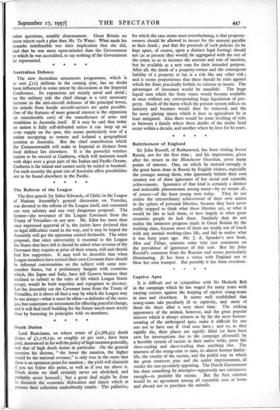Death Duties Lord Runciman, on whose estate of £2,388,453 death
duties of £1,176,130, or roughly 5o per cent., have been paid, denounced in his will the policy of high taxation generally, and that of high death duties in particular. On the general question his dictum, " the lower the taxation, the higher would be the national revenue," is only true in the sense that there is an optimum point for taxation ; the yield will diminish if you tax below this point, as well as if you tax above it. Death duties we shall certainly never see abolished, and probably never lowered ; but a great deal might be done to diminish the economic dislocation and injury which at present their collection undoubtedly entails. The palliative, for which the cage seems most overwhelming, is that property- owners should be allowed to insure for the amount payable at their death ; and that the proceeds of such policies (to be kept apart, of course, upon a distinct legal footing) should not (as at present they would) be aggregated with the rest of the estate so as to increase the amount and rate of taxation, but be available as a nett sum for their intended purpose. After all, the death of a property-owner and the consequent liability of a property to tax is a risk like any other risk ; and it seems preposterous that there should be risks against which the State practically forbids its citizens to insure. The advantages of insurance would be manifold. The huge liquid sum which the State wants would become available at once without any corresponding huge liquidation of pro- perty. Much of the harm which the present system inflicts on industry and business would thus be removed, and the far more glaring injury which it does to agriculture be at least mitigated. Also there would be some levelling of risks as between a family where three deaths of the titular head occur within a decade, and another where he lives for So years.










































 Previous page
Previous page